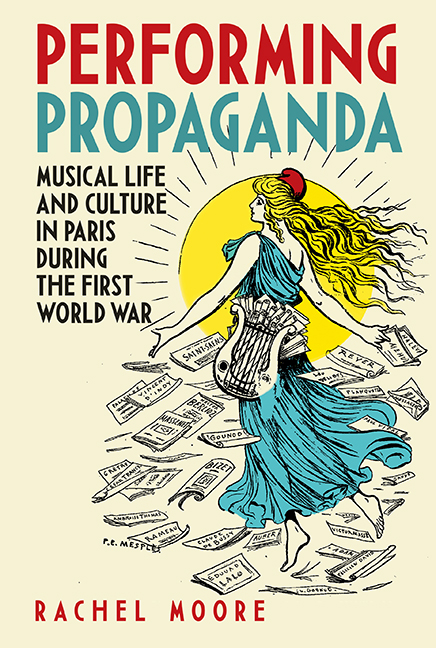 Performing Propaganda: Musical Life and Culture in Paris during the First World War
Performing Propaganda: Musical Life and Culture in Paris during the First World War Book contents
- Frontmatter
- Contents
- List of Illustrations
- List of Tables
- Acknowledgements
- List of Abbreviations
- Introduction
- 1 Musical Institutions on the Home Front
- 2 The Origins of Wartime Musical Propaganda: From the Written Word to Performing Globetrotters
- 3 Saint-Saëns's Germanophilie as a Propaganda Prototype
- 4 Propaganda on the Concert Stage: The Matinées Nationales
- 5 Creativity and Compromise at the Opéra
- 6 Music Publishing and the Édition Française de Musique Classique
- Conclusion
- Bibliography
- Index
- Miscellaneous Endmatter
4 - Propaganda on the Concert Stage: The Matinées Nationales
Published online by Cambridge University Press: 19 July 2019
- Frontmatter
- Contents
- List of Illustrations
- List of Tables
- Acknowledgements
- List of Abbreviations
- Introduction
- 1 Musical Institutions on the Home Front
- 2 The Origins of Wartime Musical Propaganda: From the Written Word to Performing Globetrotters
- 3 Saint-Saëns's Germanophilie as a Propaganda Prototype
- 4 Propaganda on the Concert Stage: The Matinées Nationales
- 5 Creativity and Compromise at the Opéra
- 6 Music Publishing and the Édition Française de Musique Classique
- Conclusion
- Bibliography
- Index
- Miscellaneous Endmatter
Summary
ON 29 NOVEMBER 1914, members from three of Paris's main concert orchestras assembled on stage in the grand amphitheatre of the Sorbonne in preparation for one of the first large-scale musical events since the outbreak of war. As they tuned their instruments, got their music in order, or exchanged a quick word with their neighbours, they might have felt apprehensive as to how the following few hours would unfold. Word had probably reached them about the angry outbursts of the 200 cold and concert-starved ticket-holders denied entry because they could not be squeezed onto the benches already populated by listeners in bulky coats, and the fact that policemen had struggled to control the masses surging through the doors and up the staircases to the amphitheatre. How would this emotionally charged Parisian public react to a musical performance after nearly four months of silence? Would the scene be one of patriotic celebration and a resounding success, or would the event merely reinforce the views of certain critics that the time was not right for reintroducing music to a public in mourning? Eventually, the audience would have settled in their seats under the watchful eyes of the college's founder, Robert de Sorbon, and some of France's most celebrated philosophers, politicians, and scientists, immortalised in statues under the room's gallery niches. And at 3pm, any concerns about the public's reaction would be cast aside: as Camille Chevillard struck his conductor's baton on the conducting stand and the orchestra began the ‘Marseillaise’, a loud cheer went up from the audience. Against the backdrop of Puvis de Chavanne's vast fresco Le bois sacré, a ‘shivering crowd’ rose to its feet to sing the French national anthem.
This event marked the start of the Matinées nationales, a series of wartime performances that took place regularly throughout the war on Sunday afternoons, founded by members of the OEuvre fraternelle des artistes as an opportunity to raise funds for their charitable endeavours. Performances were held under the patronage of Albert Sarraut, the minister for public education and fine arts, and Albert Dalimier, the under-secretary for fine arts; the day-to-day organisation of the series was jointly overseen by Albert Cortot, pianist and then private secretary to Albert Dalimier, and by the dramatist Romain Coolus.
- Type
- Chapter
- Information
- Performing Propaganda: Musical Life and Culture in Paris during the First World WarMusical Life and Culture in Paris during the First World War, pp. 97 - 138Publisher: Boydell & BrewerPrint publication year: 2018


